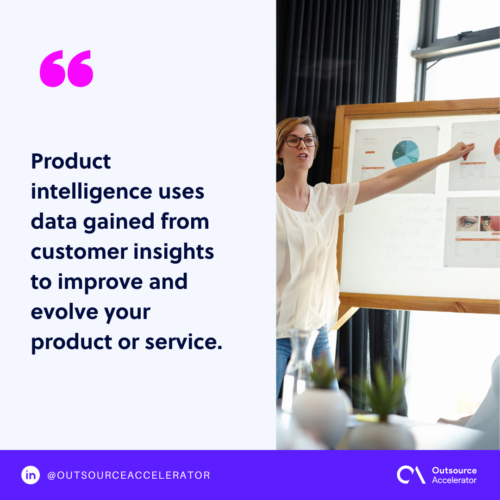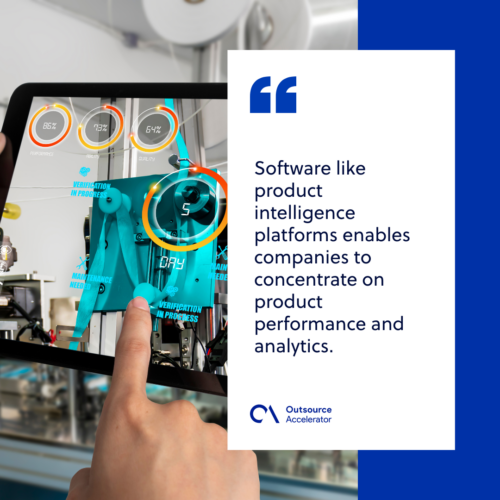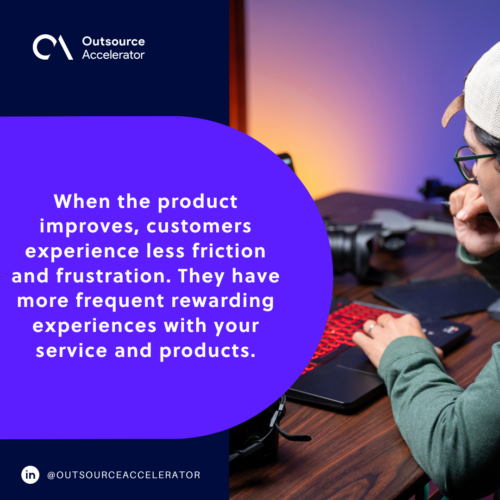What is product intelligence?

Today’s marketing landscape isn’t just a competition around whose product is best but whose experience is the best. Consumers can get so much with just the touch of a screen.
However, it hasn’t exactly made us more satisfied. Rather, it’s made us more selective of which brands we invest our time and money in.
As a response, companies have product intelligence, enabling them to continue giving people the experiences[1] they desire.
What does product intelligence mean?
Product intelligence uses data gained from customer insights to improve and evolve your product or service.
The process involves gathering and analyzing data, then acting on it by implementing the results into your product.
A high product intelligence measurement means that a company has a clear view of how, why, and how often customers use its product. The company is also ready to adapt new strategies if needed.
When done successfully, this creates a positive feedback loop[2] between companies and their customers. Each is continuously learning from the other, and both are being satisfied.

How does product intelligence work?
There is no universal way to measure product intelligence. Each company should adjust its strategy based on the products sold and the customers served. Its methods may also vary even within large corporations.
Still, here are a few of the best practices we recommend:
Product intelligence platform
Gone are the days when companies would hand out questionnaires to their customers and then have to manually read every comment written. We have the technology now, and automatization is the key to better analytics.
Software like product intelligence platforms enables companies to concentrate on product performance and analytics.
The ideal platform will give you an easily accessible, collaborative environment. This makes it easier for data to be collected and examined by multiple teams.
Data visualizations complement tools that measure product analytics. Through them, the data becomes more understandable, comprehensive, and comfortable.
A large benefit of modern tools like these is their ability to monitor statistics in real-time. The company then wastes no time in adjusting the product where needed.

Team resources
Product teams must be given complete access to relevant customer data. This may include direct contact with the customers to gain quantitative and qualitative insights.
Managers should also allow their teams room to solve problems and freely run experiments. This is especially true during the innovation stages.
The company must be sure to outline policies and create a resource portal that includes tools, tips, and research. In the same vein as product intelligence itself, this portal must be updated regularly.
Data gathering
Product intelligence and analytics platforms automatically organize and arrange the data to generate reports. The product research will show where to focus your efforts, when a line should be discontinued, or when to debut a new product.
Conducting quarterly business assessments is also a traditional method. A detailed markup of data is obtained to be analyzed.
Consumer feedback
From customer interviews, surveys, focus groups, and other means, the feedback is then analyzed. Today’s technology can look at text analytics, such as social media comments and ratings.
Consumer feedback is the core of product intelligence, providing you with the best picture of how the features of your product play out.
Tracking the product in real time allows companies to observe its life cycle and build around it. Take note of keyword analytics, as these will help drive users to your product.
Follow-up tests
The resulting data reports serve as a baseline for testing new product improvements and features. This process involves experimenting with new features and measuring how they affect conversion rates and customer sentiment.
Doing so will also allow the product team to find any bugs or inconsistencies they overlooked.
Analyze competitors
The product intelligence mechanism isn’t just about what actions your company is taking, but also your competitors. After all, you don’t exist in a vacuum. Awareness of the competitive landscape is also a factor in improving your services.
This may involve studying the competitors’ products, customers, marketing tactics, and sales strategies.
Companies may have their own product and marketing teams analyze product data. But outsourcing data analysts for product development is also a viable option. Cloudstaff includes this offer as part of their e-commerce solutions.
The benefits of product intelligence
It’s always good to have more information to use. Managing product intelligence will give companies the following benefits:
Better customer experience
When the product improves, customers experience less friction and frustration. They have more frequent rewarding experiences with your service and products. They enjoy the features you’ve placed instead of being dragged down by them.
Companies now primarily compete for customer experience and satisfaction. Admitting and solving a flaw in your product will add a point in your favor.

Customer loyalty
Customers may change how they feel about a brand. With such rapidly changing feelings, the concept of product intelligence means that brands can now adapt to the customer instead of the other way around.
If a product makes a bad impression, customers choose something new and are unlikely to return. Showing that a brand listens to and acts on its criticisms will give customers the experience they’re looking for.
Innovation
Many companies, once they’ve reached a point where their product is selling very well, may fall into stagnation. Already comfortable with their sales, they don’t seek to improve.
Product intelligence will show why they need to. Whereas innovation was mainly seen as rare bursts of inspiration, product intelligence makes innovation a constant.
Improved quality control
A large part of product intelligence is tracking KPIs, which ensures flaws don’t go unnoticed. It also takes out the guesswork when adding improvements.
Managers and designers can facilitate updates and features properly, and marketers can develop new campaigns and design more effective ads.
Competitive advantage
A company that makes use of product intelligence is one that stays relevant. Measuring product intelligence evolves not just the product, but the company practices as well.
When presented with a multitude of brands to choose from, the advantage goes to the one that caters to its customers the most strategically.







 Independent
Independent




